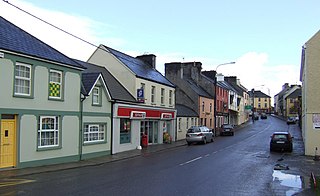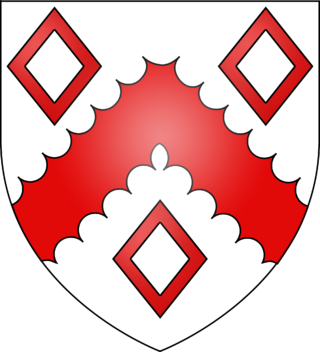Related Research Articles

Thomas Spring Rice, 1st Baron Monteagle of Brandon, was a British Whig politician, who served as Chancellor of the Exchequer from 1835 to 1839.

Lavenham is a village, civil parish and electoral ward in the Babergh district, in the county of Suffolk, England. It is noted for its Guildhall, Little Hall, 15th-century church, half-timbered medieval cottages and circular walks. In the medieval period it was among the twenty wealthiest settlements in England.

Milltown is a small town on the N70 national secondary road between the major towns of Tralee and Killarney in County Kerry, Ireland. It is approximately 7 kilometres (4 mi) from Killorglin.
Mervyn Archdall was an Irish antiquary and clergyman of the Church of Ireland.

The Spring family is a Suffolk gentry family that has been involved in the politics and economy of East Anglia since the 15th century, as well as holding large estates in Ireland from the 16th century.
Sir William Spring of Lavenham was an English politician and landowner.

Sir Thomas Spring, 3rd Baronet of Pakenham Hall in Pakenham, Suffolk, was an English baronet and landowner who served as High Sheriff of Suffolk in 1696.

Sir Thomas Kitson was a wealthy English merchant, Sheriff of London, and builder of Hengrave Hall in Suffolk.
Sir John Spring, of Lavenham, Buxhall, Hitcham, and Cockfield, Suffolk, was an English merchant and politician.
The Godfrey Baronetcy of Bushfield in the County of Kerry was a title in the Baronetage of Ireland. It was created on 17 June 1785 for William Godfrey, member of the Irish House of Commons for Tralee. The title became extinct on the death of the seventh Baronet in 1971.

Thomas Spring of Lavenham in Suffolk, was an English cloth merchant. He consolidated his father's business to become one of the most successful in the booming wool trade of the period and was one of the richest men in England. He has been described as the most important figure of the early Tudor cloth industry.
The High Sheriff of Kerry was the British Crown's judicial representative in County Kerry, Ireland from the 16th century until 1922, when the office was abolished in the new Free State and replaced by the office of Kerry County Sheriff. The sheriff had judicial, electoral, ceremonial and administrative functions and executed High Court Writs. In 1908, an Order in Council made the Lord-Lieutenant the Sovereign's prime representative in a county and reduced the High Sheriff's precedence. However, the sheriff retained his responsibilities for the preservation of law and order in the county. The usual procedure for appointing the sheriff from 1660 onwards was that three persons were nominated at the beginning of each year from the county and the Lord Lieutenant then appointed his choice as High Sheriff for the remainder of the year. Often the other nominees were appointed as under-sheriffs. Sometimes a sheriff did not fulfil his entire term through death or other event and another sheriff was then appointed for the remainder of the year. The dates given hereunder are the dates of appointment. All addresses are in County Kerry unless stated otherwise.
Sir Stephen Rice (1637–1715) was Chief Baron of the Exchequer in Ireland and a notable supporter of James II.

James fitz John FitzGerald, 13th Earl of Desmond, also counted as the 14th, ruled 22 years, the first 4 years as de facto earl until the death of James FitzGerald, de jure 12th Earl of Desmond, called Court Page, who was murdered by James fitz John's brother Maurice fitz John FitzGerald, called Totane. James fitz John FitzGerald maintained himself in power by skilful diplomacy, avoiding armed conflict and destruction. He was appointed Lord Treasurer of Ireland in 1547.

Killagha Abbey of Our Lady of Bello Loco, also called Kilcolman Abbey, is a ruined Augustinian abbey and former manor house in County Kerry, Ireland. The abbey is situated one and a half miles north-west of Milltown on the banks of the River Maine.
Walter Spring the Unfortunate was an Anglo-Irish Roman Catholic landowner involved in the Irish Confederate Wars.
Sir William Duncan Godfrey, 3rd Baronet (1797–1873) was an Anglo-Irish aristocrat and landowner.
Walter FitzOther was a feudal baron of Eton in Buckinghamshire and was the first Constable of Windsor Castle in Berkshire, a principal royal residence of King William the Conqueror, and was a tenant-in-chief of that king of 21 manors in the counties of Berkshire, Buckinghamshire, Surrey, Hampshire and Middlesex, as well as holding a further 17 manors as a mesne tenant in the same counties.

Edmund Wright of Sutton Hall in the parish of Burnt Bradfield in Suffolk and of Buckenham Tofts in Norfolk, was a Member of Parliament for Steyning in Sussex in 1559.

Castle Maine, also recorded as Castle Magne and Castlemaine, was a medieval castle located at what is now Castlemaine, County Kerry. The castle, built in 1215, stood on a bridge over the River Maine. A defensive structure of considerable importance in Munster, it belonged first to the Earls of Desmond and later to the English Crown. Castle Maine was besieged on several occasions, including during the Nine Years' War when the garrison resisted for thirteen months. It was destroyed in 1652 during the Cromwellian conquest of Ireland.
References
- ↑ Michael C. O'Laughlin, Families of Co. Kerry, Ireland (Irish Roots Cafe, 1994), 137.
- ↑ Joseph Jackson Howard, ‘Spring’, The Visitation of Suffolk (Whittaker and Co, 1866), 165-206.
- ↑ Raleigh in a letter to Hicks: "I am most earnestly to entreat you for this gentleman Captain Spring, that partly for love, partly for honest consideration, you will further him with my Lord Treasurer for a debt of £300 which her Majesty doth owe him. It hath been long due and he hath good warrant for it. Besides he hath served her Majesty very long, and hath received many wounds in her service. These reasons delivered by a man of your utterance, and having his good angel at your elbow to instruct you, I doubt not but it will take good and speedy effect." Carmody, p.290.
- ↑ James Carmody, Story of Castle Magne, Co. Kerry, Kerry Archaeological Magazine, Volume 1, No. 2 (April 1909), pp. 49-79.
- ↑ James Carmody, 'The Abbey of Killagha, Parish of Kilcoleman, County Kerry', The Journal of the Royal Society of Antiquaries of Ireland, Fifth Series, Vol. 36, No. 3, p.290.
- ↑ Brid McGrath, A biographical dictionary of the membership of the Irish House of Commons 1640-1641 (Trinity College (Dublin, Ireland), 1998), p.A50 (Retrieved 31 March 2020).
- ↑ Michael C. O'Laughlin, Families of Co. Kerry, Ireland (Irish Roots Cafe, 1994), 137.
- ↑ Joseph Jackson Howard, ‘Spring’, The Visitation of Suffolk ( Whittaker and Co, 1866), 165-206.
- ↑ Charles Smith, The Antient and Present State of the County of Kerry (1756), 57.
- ↑ "Notes on Kerry Topography, Ancient and Modern" (ctd.) by Mary Agnes Hickson, Journal of the Royal Historical and Archaeological Association, Fourth Series, Vol 5, No. 44 (Oct 1880), pp.349-364.
- ↑ Joseph Jackson Howard, ‘Spring’, The Visitation of Suffolk ( Whittaker and Co, 1866), 165-206.
- ↑ James Carmody, 'The Abbey of Killagha, Parish of Kilcoleman, County Kerry', The Journal of the Royal Society of Antiquaries of Ireland, Fifth Series, Vol. 36, No. 3, p.291.